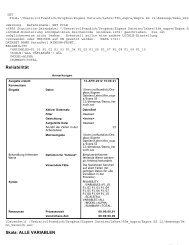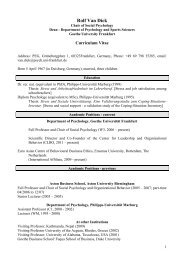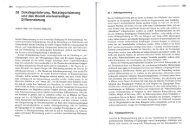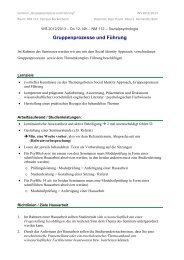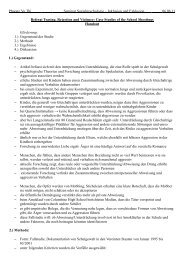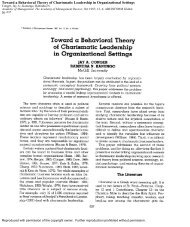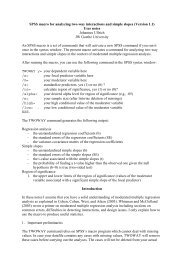Leadership-Interview-Transkript - Sozialpsychologie - Goethe ...
Leadership-Interview-Transkript - Sozialpsychologie - Goethe ...
Leadership-Interview-Transkript - Sozialpsychologie - Goethe ...
Erfolgreiche ePaper selbst erstellen
Machen Sie aus Ihren PDF Publikationen ein blätterbares Flipbook mit unserer einzigartigen Google optimierten e-Paper Software.
genuine being open being curious to learn being kind with people and above all being<br />
appreciative and continuing to be appreciative. I think even just putting those steps in place<br />
you are kind of 90% at the way there as a leader. Making sure people are clear about what it is<br />
very quiet to do, making sure they feel valued, respected and supported and as I said earlier<br />
intervening in the areas of the organization which are toxic and not allowing that to become<br />
chronic.<br />
Rolf van Dick: Those things you mention are simple messages when you say people can<br />
learn to do this to become more effective leaders. I mean we have all this business schools<br />
and training institutes and our research hopefully is putting into some practice. Why does it so<br />
often go wrong? Why are many people so ill, burned out and especially absenteeism is a big<br />
problem in the UK and in Germany. Why do we have these problems?<br />
Prof. Michael West: I think the reason is, that we do not put the principles into operations<br />
and I think it is a challenge for us, as researchers and as organizational scholars, to try to<br />
understand why is it that given all the knowledge we have about what makes for an effective<br />
organization managers and leaders not actually doing that in practice. And it seems to me<br />
there are probably a number of reasons. One is a sort of cultural legacy that for the last 100<br />
years we have had the legacy if you like the old historical industrial context where command<br />
and control was the way that you got things done in mass production in the way you got<br />
things done in heavy industries which were male dominated anyway. We have to somehow<br />
let go of this cultural legacy and begin to recognize that that is not an effective way of<br />
ensuring productivity and profitability in the well being of people as you indicated. I think<br />
there is as well something about the leaders in organizations who are predominantly males,<br />
and as you know the male approach is often to do do do and to be focused on getting things<br />
done, making an impact, making a difference, driving and being strong. If you like<br />
stereotypical female orientation of nurturing, enabling, listening and taking time, I want to say<br />
that human communities have evolved in ways with to enable them to survive and human<br />
communities had always a balance of men and women. Many of our organizations do not,<br />
they are dominated by the men on the top and that I think is potentially unhealthy.<br />
I think the third reason why we do not put into practice what we know from so much research<br />
is that managers often feel that the people stuff although it is called soft, the soft side of<br />
management it is actually the hard side of management. It is much easier to deal with a set of<br />
accounts, a piece of technology, a set of e-mails to respond it seems then to sit and listen to<br />
your staff when they have concerns when they have suggestions to change when they express<br />
their anxieties. Somehow to managers it seems that the people stuff is hard rather than soft<br />
and so I think they avoid it and yet everything that we know is that actually the people side of<br />
organizations the outcomes are so much better because people take care of the technology the<br />
finances and the other tasks.<br />
Rolf van Dick: What are the biggest obstacles then or which obstacles have you observed to<br />
make you effective leader? Is it the people you deal with, the environment, the rules or is it<br />
maybe pressure from the outside?<br />
Michael West: I think one pressure is the inbuilt tendency of organizations to standardize<br />
procedures. Organizations are in the business of ensuring that there is a standard way of doing<br />
things and that all of people who make up the organization behave in particularly ways. So<br />
that tendency to standardization and homogenization if you like I think is a barrier, because<br />
what it does is it tells people you cannot do things differently. Now at a superficial level<br />
people will agree with what I am saying but I think it has deep consequences because it means<br />
that many of the messages people get at work are messages to tell them what you can do and




